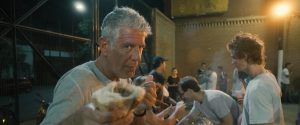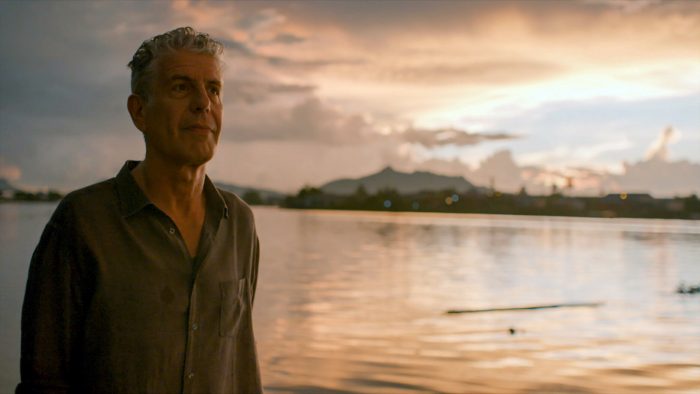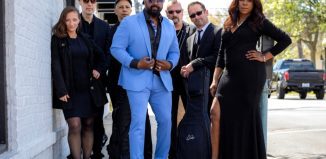Movie Review: ‘Roadrunner — A film about Anthony Bourdain’
Reviewed by Jeffrey Sanzel
Not since Julia Child has a chef had a higher profile than Anthony Bourdain. Smithsonian Magazine labeled him “the original rock star” of the culinary world. Gothamist referred to him as a “culinary bad boy.” His uncensored television persona was known for its profanity and sexual references.
Born in Manhattan in 1956, Bourdain graduated from the Culinary Institute of America in 1978. He ran several high-end kitchens, notably serving as executive chef of New York’s brasserie Les Halles. Bourdain’s memoir Kitchen Confidential: Adventures in the Culinary Underbelly (2000) became a bestseller, followed by additional works of both fiction and non-fiction. His television work included A Cook’s Tour, Anthony Bourdain: No Reservations, The Layover, and appearances on a variety of television programs.

On June 18, 2018, while in France filming Anthony Bourdain: Parts Unknown, he committed suicide. He was sixty-one years old.
In Roadrunner: A Film About Anthony Bourdain, director Morgan Neville explores the controversial celebrity chef through extensive video and interviews with friends and associates. While his childhood and early career are mentioned, the timeline begins with his rise to fame with the publication of Kitchen Confidential.
With a two-hour running time, the expectation is a complete look at Bourdain. Fans will embrace the documentary, showing the subject in a sympathetic, if complicated light. Those who are less enamored will find it unsatisfying. Bourdain talks, smokes, eats, smokes, preens, and smokes. It touches on his drug use and hedonistic lifestyle. But mostly, the film consists of watching him smoke, talk, and preen. He ponders about life and his purpose. He travels. He smokes. In one particularly ghoulish cut, he eats a beating cobra heart. But mostly, he talks and smokes.
Neville almost ignores Bourdain as a chef for highlighting the man “hooked on travel,” describing him as “always rushing (thus the title). Bourdain was on the road at least two hundred and fifty days a year, covering hundreds of thousands of miles. The film emphasizes the exotic places: Lebanon, Port-au-Prince, Laos, and most dangerously, the Democratic Republic of the Congo, his Apocalypse Now/Heart of Darkness moment.
This would all be fine if it did not feel so posed. Neville constantly presents a brooding Bourdain, looking lost and despondent, or walking alone on the beach. Whether this reflects Bourdain or the filmmaker cobbling together footage to support his thesis, it is hard to parse. Particularly squirm-worthy is a clip of Bourdain in therapy that rings false and hollow.
There is a nod to his nearly thirty-year marriage to Nancy Putkoski that dissolved with Bourdain’s rise in fame, which “burned down [his] previous life.” His second wife Ottavia Busia (to whom he was married from 2007 to 2016) is interviewed extensively and has mostly kind things to say (whether this is fact or editing …). It was with Ottavia that he had his only child, Ariane.

In 2017, he began seeing the much younger Italian actress, Asia Argento. She became heavily involved with and perhaps manipulative of his professional life before ending the relationship. The film less than subtly speculates that this contributed to his suicide. Argento declined to be interviewed, leaving a large hole in the accounting of his final days.
Neville alludes to Bourdain’s controlling side, illustrated by Bourdain’s range of obsessions, including taking up jujitsu at age fifty-eight. He became outspoken during the #MeToo movement, but this might have been due to Argento’s activism more than his personal beliefs. (One fascinating detail references him speaking ad nauseum about Argento’s skill at parking.) But nothing lasted with him—“not a person, place, or thing.”
The talking heads range from his producers and travel companions to various artists and musicians who became confidants. They seem to speak freely and appear devastated by his death. What is missing are interviews with people outside in the inner circle, who might cast light on the less sensitive behaviors and actions of which there are only hints.
There are multiple clips of Bourdain referencing violence against himself or others. His talks of self-doubt may be real or just part of the façade. Given the myriad footage, these could be passing comments. Even more damning is Helen Rosner’s interview with Neville in The New Yorker. Neville admitted to using A.I. technology for the construction of some of Bourdain’s voiceovers: “There were three quotes there I wanted his voice for that there were no recordings of … I created an A.I. model of his voice.”
Roadrunner feels incomplete, vaguely disingenuous, and almost rigged. And while all documentaries have a point-of-view, one wishes for a more objective and whole look at an unusual individual with a troubling legacy.
Rated R, Roadrunner: A Film About Anthony Bourdain is now playing in local theaters.







